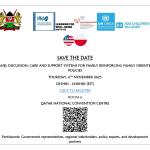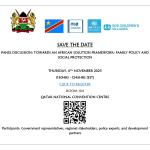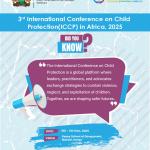Alternative Family Care
Mandate
The section has the mandate to enhance implementation of the Children Act, 2022 and that of other relevant provisions of the regional and international instruments regarding the protection and well-being of children in Alternative care.
The alternative family care department, alongside other competent authorities ensure the supervision of the safety, wellbeing and development of any child placed in alternative care and the regular review of the appropriateness of the care arrangement provided through a case management process.
Article 20 Section1 of the United Nations Convention on the Rights of the Child (UNCRC) states that, a child temporarily deprived of his or her family environment, or whose own best interests cannot be allowed to remain in that environment, shall be entitled to special protection and assistance provided by the state. While section 2 of the same article requires state parties to ensure placement to alternative care for such a child. Kenya has domesticated the UNCRC through the children’s Act 2001 in which section 6 provides for the right of a child to live with their parent and where this is not possible to be provided with alternative care.
In this regard, the Government through the State Department for Children Services has been providing alternative care services to the children in Kenya.
This department is the backbone of Kenya’s care reform efforts, shifting focus from institutional care to family- and community-based solutions that uphold every child’s right to grow up in a safe, loving environment.
Functions of the Department
- Spearhead implementation of Child Care Reforms in Kenya
- Design and oversee implementation of Alternative Care Programs
- Awareness creation on Alternative care
- Capacity building practitioners on alternative care/care reforms.
- Develop implementation instruments and operating procedures on alternative care services
- Maintain the National Foster Care Register;
- Monitor implementation of alternative care programs and services
- Conducting baselines surveys and situations analysis for children in alternative care
- Facilitate children in alternative care to have a stable home that guarantees their basic needs for safe and continuous attachment to their caregivers
- Coordination, networking, advocacy and resource mobilization for implementation of Alternative Care/Care reform Programs and Services
- Utilize Child Protection Information Management System (CPIMS) platform (alternative care module) for real time monitoring of progress of children placed in alternative care
- Support gatekeeping mechanisms at the county level to prevent unnecessary child-family separation
- Ensure timely reintegration of children placed under alternative care.
What is alternative care?
Alternative care refers to any arrangement formal or informal where a child is taken care of away from their biological parents, either temporarily or permanently, because their family is unable, unwilling, or unfit to care for them.
Alternative care ensures that children who cannot live with their parents still grow up in safe, nurturing environments that support their physical, emotional, and social development. It’s a key part of child protection systems worldwide, including in Kenya, where reforms are shifting toward family and community-based care.
Guiding Principles
- Necessity: Children should only be placed in alternative care when absolutely necessary.
- Best interests of the child: Every decision must prioritize the child’s safety, development, and well-being.
Forms of alternative family care
Kinship- placement of a child on a temporary or long-term basis to his/her extended family from either the maternal or paternal side.
Guardianship- a guardian is a person appointed by will or deed or through an order of the Court to assume parental responsibility over the child either alone or jointly with the surviving parent of the child under to assume parental responsibility on the death of the parent. As per the children act, a person appointed is a kenyan citizen.
Foster care is placement of a child/children on a temporary basis with a person who is not their parent, relative or guardian. A foster care certificate issued last for one year and can be renewed for up to 3 years. Extension beyond 3 years is through the children’s court.
Adoption is a process through which a child is permanently placed with a legal parent/parents. Adoption orders are issued in high court which legally gives the child all rights as if he/she was born of that family.
Kafaala-This is the form of alternative care practised by persons who profess the Islamic faith. It is guided by the sharia law and the islamic culture. It can take the shape of foster, guardianship or kinship care.
Supported independent living- Supported Independent Living is a care arrangement where older children or young adults live on their own or in shared housing with structured support to help them transition into adulthood.
Supported child headed households- A child-headed household is one where no adult caregiver is present, and a minor (often the eldest sibling) takes on the role of head of household, caring for younger siblings. These arise due to parental death, abandonment, or displacement.
Supported CHHs are those where external support systems—like NGOs, community volunteers, or government programs—step in to assist.
Institutional care - Residential facilities (used only as a last resort).
Achievements
- Strengthened collaboration and partnerships with State and Non-state Actors
- Capacity building of Social work force and stakeholders
- Benchmarking and learning visits Locally, Regionally and Internationally to Rwanda, UK, Uganda, USA
- Use of demonstration counties (Kisumu,Nyamira,Kilifi,Muranga,Kiambu) to generate learning and provide promising practices for care reform scale up.Celebration of Inaugural National foster care week-2024
- Care reform implementation in 15 counties.
- Mainstreaming disability in care reforms (kasarani program)- assessment done to 1,358 children in CCIS, out of which 112(49 girls/63 boys have disabilities-children supported through UNICEF Support
- Transition of residential care-18 institutions have fully transitioned
- Kisumu- 6 institutions
- Muranga- 2 institutions
- Nyamira- 5 institutions
- Kilifi- 2 institutions
- Kakamega-3
- Increased awareness creation to demystify alternative care and enhance absorption of alternative care services amongst the community
- Development of implementation tools/documents on alternative care/care reforms
- 1926 foster parents recruited nationally.
- Adoption implementation across the 47 countries from Jan 2024 to date is 569 children (298 boys, 271 girls).
- Use of case management to support reintegration. Supported family assessment/reintegration of 873 children,1208 in foster ( 545 boys, 663 girls)
Reference Materials
• Guidelines for Alternative Family Care of Children in Kenya 2014
• Case Management for reintegration to family and community-based care (2019)
• Standard operating procedures (SOPS) for implementing family and community-based care for children (2022)
• National Gatekeeping Guidelines for children in Kenya (2022)
• National foster parents’ facilitators training guide (2024)
• National facilitators guide for training foster care practitioners (2024)
• Development of the training manuals for Foster Care Parent and Manual for the professionals in Foster Care
• National framework for implementation of Kafaalah Care for children in Kenya (2024)
• Mentorship guidelines for supported independent living and supported child headed households (2024)
• National care reform strategy for children in kenya(2022-2032)
• Animation tool for Alternative family care (English/Kiswahili versions)-For awareness creation.
Supporting Partners
1) UNICEF
2) Catholic Relief Services (CRS)-changing the way we care(CTWWC) initiative
3) Legaturm foundation
4) Stahili foundation
5) SOS Children’s Village, Kenya
6) Catholic Diocese of Murang’a
7) Tree of Life (FADV)
8) LUMOS Foundation
9) Child in Family Focus
10) Macheo Children’s Centre
11) Tushinde Trust
12) Diocese of Meru



